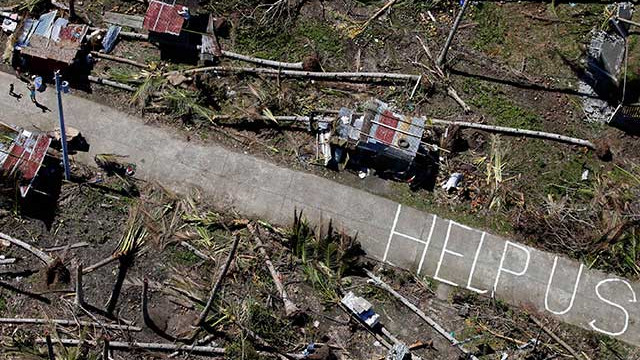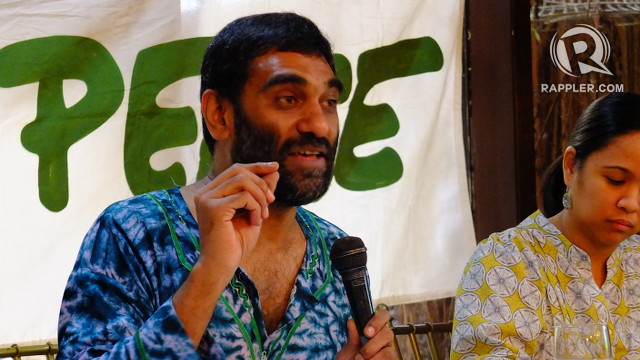SUMMARY
This is AI generated summarization, which may have errors. For context, always refer to the full article.

MANILA, Philippines – Who should pay for the loss of lives and billions worth of damage caused by typhoons like Yolanda (Haiyan)?
Green groups point their fingers to the top fossil fuel companies reaping profit as they emit greenhouse gases into the atmosphere, causing global warming.
For this reason, President Benigno Aquino III should demand compensation for Yolanda’s devastation from these fossil fuel companies.
This was the call of environmental group Greenpeace during a December 12 press conference more than a month after the super typhoon barreled into the Philippines causing more than 6,000 deaths and billions worth of damage.
“As one of the countries most vulnerable to climate change impacts, it’s about time that we, as a nation, hold these companies liable for their role in abetting global warming and our addiction to fossil fuels,” said Von Hernandez, Director for Greenpeace Southeast Asia.
A recent study makes it possible to identify fossil fuel companies that have greatly contributed to climate change by emitting large amounts of greenhouse gases (GHG) like carbon dioxide and methane into the atmosphere.
The study by climate change scientist Richard Heede showed that the biggest multinational and state-owned fossil fuel companies like Chevron, Shell and ExxonMobil have spewed 63% of all carbon and methane emissions from 1854 to 2010.
As major emitters, these corporations are called climate culprits by environmentalists because their emissions have contributed to the accelerated warming of the planet.
This warming has led to extreme weather events like freak typhoons, sweltering summers, droughts that threat food security, and storm surges that threaten humanity.
“We as citizens have an obligation as well as a right to hold those companies directly responsible for destruction accountable. For far too long now, oil and gas companies have literally gotten away with murder,” said Kumi Naidoo, Director of Greenpeace International.
Climate litigation
Aquino should pursue legal action against these companies in an international court and demand monetary compensation.
Sounds crazy? Naidoo is dead-serious.
“In the same way that companies account for dumping toxics in rivers and oceans and other places, there is environmental legislation that allows citizens and their governments and communities to take those companies to court and get them to pay for damages and compensate the communities.”
He likened this to how British multinational oil and gas company BP was made to pay billions to compensate communities adversely affected by the 2010 Gulf of Mexico oil spill.
There is already a growing body of literature and knowledge on “climate litigation,” he said.
A legal tool called the Transboundary Environmental Impact Assessment was first used by the tiny island nation Federated States of Micronesia to compel a coal plant in Poland to undergo an environmental impact assessment because of the climate change impact it would have on the island nation on the other side of the globe.
A United Nations climate change report identified low-lying islands like Micronesia as being frontline victims of climate change. Sea level rise caused by the phenomenon can easily submerge the entire nation.
Greenpeace said they are more than willing to support Aquino in his bid for climate justice by providing legal and scientfic evidence.
“But if the government is not prepared to move, we are also willing to explore other legal options together with other civil society partners,” said Naidoo.
Steep learning curve
But how does one quantify liability for climate change damage when it can be caused by a myriad of factors? For instance, is it not safe to say that the staggering Yolanda damage is partly the fault of a government ill-prepared to handle the storm?
This will be part of the “steep learning curve” and “homework” that has to be done as the world explores climate litigation, he said.
“We’re not saying that 100% of the responsibility goes to one party but it’s clear that at least in excess of 60% of the responsibility lies with fossil fuel companies,” said Naidoo.
And in the face of such an off-the-charts typhoon as Yolanda, the Philippine government cannot be completely blamed.
“If you look at Tacloban, even if you factor in disaster-preparedness the whole city was devastated. No amount of disaster preparedness could have anticipated the ferocity of the typhoon. This is part of the homework as we explore legal avenues,” said Hernandez.
Climate litigation may seem as esoteric now as tobacco litigation was a few years back. But now, individuals demanding cigarette companies for wrongful death, injury and medical expenses have won court cases.
Fossil fuel companies can now no longer ignore the clarity of science in identifying fossil fuel burning as the single biggest cause of climate change, said Naidoo.
And though fossil fuel companies today are still widely accepted by humanity, that will not always be the case.
“I want to say to the CEOs of fossil fuel companies, just because today what you do is legal, it does not mean that in the coming years and coming decades, you will continue to have the kind of protection you currently have… Because it is legal, it does not make it just,” Naidoo explained. – Rappler.com
Add a comment
How does this make you feel?

There are no comments yet. Add your comment to start the conversation.